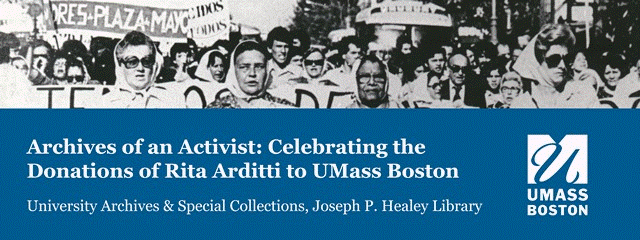
Full Program, Presentations and Remarks
Location
Special Collections Research Room, Joseph P. Healey Library, UMass Boston
Start Date
22-4-2013 5:30 PM
End Date
22-4-2013 5:40 PM
Description
From Ann Blum's remarks:
My own area of research is family history. Students and other scholars sometimes ask me why I study the family when there are other far more important, more politicaltopics. Rita’s activism and scholarship provide a ringing rejoinder. The family is political and it is key to our understanding of politics on intimate, national and global scales. Rita’swork with the Grandmothers centered on family. Her study embraced the complex interactions among three generations as family relations were projected onto national and international politics. The Argentine military regime was brutally astute: they made state terrorism a family affair. After torturing and murdering the young activist parents, the regime concealed the family origins of their victims’ children and placed many of them with the parents’ torturers to raise. Surviving children lost their parents. The loss of their children and grandchildren inflicted searing emotional pain on the elder survivors. Rita’s scholarship spotlights the ravages brought about by the deliberate politics of targeting the institution of the family and depriving the state’s political opponents of the life-giving satisfactions of family bonds across generations. The inspiring courage of the Grandmothers of the Plaza de Mayo, acting first a caregivers to their children and grandchild and later as nurturers of the nation’s conscience, was to expose that brutality, to seek justice for its victims, and to seek an end to impunity for the perpetrators.
Remarks by Ann Blum about Rita Arditti, the Abuelas, and Latin American Studies
Special Collections Research Room, Joseph P. Healey Library, UMass Boston
From Ann Blum's remarks:
My own area of research is family history. Students and other scholars sometimes ask me why I study the family when there are other far more important, more politicaltopics. Rita’s activism and scholarship provide a ringing rejoinder. The family is political and it is key to our understanding of politics on intimate, national and global scales. Rita’swork with the Grandmothers centered on family. Her study embraced the complex interactions among three generations as family relations were projected onto national and international politics. The Argentine military regime was brutally astute: they made state terrorism a family affair. After torturing and murdering the young activist parents, the regime concealed the family origins of their victims’ children and placed many of them with the parents’ torturers to raise. Surviving children lost their parents. The loss of their children and grandchildren inflicted searing emotional pain on the elder survivors. Rita’s scholarship spotlights the ravages brought about by the deliberate politics of targeting the institution of the family and depriving the state’s political opponents of the life-giving satisfactions of family bonds across generations. The inspiring courage of the Grandmothers of the Plaza de Mayo, acting first a caregivers to their children and grandchild and later as nurturers of the nation’s conscience, was to expose that brutality, to seek justice for its victims, and to seek an end to impunity for the perpetrators.


Comments
For the full text of Ann Blum's remarks, click here.